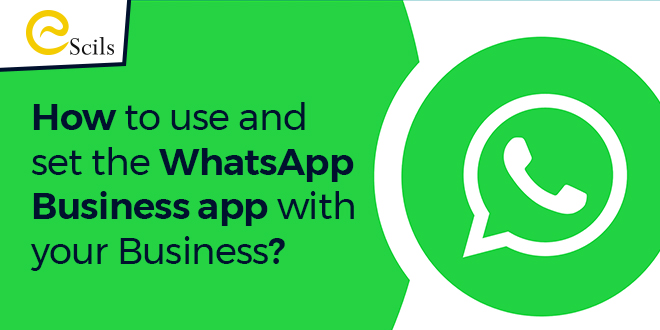WhatsApp has a huge user base. With over 1.5 billion monthly active users in 180 countries, it is the most common messaging app on the planet. WhatsApp Business was launched in early 2018 as a platform for small and medium-sized businesses. WhatsApp Business makes it simple for companies to communicate with their customers and foster loyalty, which is crucial in today’s world.

Why Whatsapp Business App?
Simplest terms, WhatsApp Business enables businesses to communicate with their customers safely and securely via the WhatsApp messaging network. The sheer scale of WhatsApp’s audience makes it attractive to advertisers. There are three major reasons why companies should seriously consider establishing a WhatsApp presence. WhatsApp is a good way to communicate with customers. It allows community managers to quickly and efficiently communicate with consumers. If a brand’s response time is less than 24 hours, it’s free. From sending paid updates to directly contacting leads, WhatsApp marketing is more effective than many brands believe. Marketers may use a variety of tactics and features to maximize sales and conversions.
Difference between Whatsapp Business API and Whatsapp Business App

If you’re using WhatsApp for work, it’s not a good idea to do so with a personal account. You run the risk of losing access to your account, as well as missing out on several useful features.
WhatsApp has a solution for small businesses: WhatsApp Business. This software is designed, for Android and iOS but it’s also available as an online network called WhatsApp Web, which you can use in-browser if your company already has a WhatsApp business account.
WhatsApp Business is developed specifically for small businesses that want to manage their WhatsApp presence. It’s free to use, but it’s a little less efficient than the WhatsApp Business API.
Small companies can use the WhatsApp Company app as a stand-alone mobile app. It enables companies to interact with their customers. Someone placing an order with their local bakery or shopkeepers who want to stay in contact with their customers through a mobile app are examples of use cases.
Larger companies with higher message volumes and a need for business process automation and integration within their current communication channels would benefit from the WhatsApp Business API.
SETTING UP WHATSAPP BUSINESS PROFILE
Small companies have traditionally conducted business or provided customer service using the standard WhatsApp app. Although this can also work, building a company profile can give your conversations a lot more credibility.
- Simply download the WhatsApp Business app from the Google Play Store to get started.
- Use your cell phone number to sign up. Using your business phone number is ideal because it will make verification much simpler later on.
- Enter your company information under Settings > Business Settings > Profile to build your profile. Make sure you enter information such as your company’s name, address, and contact information correctly.
It’s now time to set up the app after you’ve finished building your business profile. The WhatsApp Business app includes several smart messaging features that can help you save time and simplify your life. You can program greeting and away messages to be sent automatically. You may also set up automated responses for your clients.
Here’s how to get WhatsApp for Business up and running:
- Simply go to Settings > Business Settings and check the messaging options available there to set up these messaging tools.
- Away message, Greeting message, and Quick answers are the three choices available. Each of these can be customized to meet your needs.
- When you’re unable to respond to your customers, you may set up an automated away post. You may also get the away message sent at any time, on a custom timetable, or outside of business hours. When a customer contacts you for the first time or after 14 days of inactivity, a greeting message is automatically sent. You can set up a simple message, choose a shortcut, and choose keywords for fast responses (optional). When you’re answering commonly asked questions or just want to share pleasantries, these come in handy.
Marketing Tips & Tricks On Whatsapp Business Profile
Despite WhatsApp’s 1.5 billion+ users, only a small percentage of companies use it for marketing. This means there would be less competition and a less irritated audience. Furthermore, the constraints of WhatsApp marketing will push you to be more creative in your approach. Here are some of the most effective strategies for overcoming the difficulty of initiating a WhatsApp marketing campaign.
- Whatsapp Stories: About 450 million people use WhatsApp Status regularly. Businesses are losing out on one of the most popular social media platforms. Telling fun, human stories is one way to increase brand recognition and consumer loyalty. Another choice is to make more promotional use of your Status. Consider using photographs or videos to promote flash sales or limited-time discounts. This is a perfect way to generate FOMO because the material will vanish after 24 hours.
- Whatsapp Groups: Groups are the perfect way to build a community around your brand on WhatsApp. They allow a group of up to 256 people to connect with your business. WhatsApp Groups have a lot of untapped content marketing potential. However, think about WhatsApp’s guidelines for promotional messaging and ask for permission if you think you’re breaking them.
- Non-traditional Campaigns: Before you can contact someone on WhatsApp, they must first send you a message. Since you can’t make the first move, you’ll have to think outside the box.WhatsApp marketing aims to get people to contact you, send you their phone number, or join your Groups. That means you must make it worthwhile for them.
CONCLUSION
WhatsApp will also have advertising capabilities. WhatsApp Status advertisements were revealed in October 2018 and will be available this year. Brands that get on board with the ad format right away would almost certainly be able to attract a large audience. Facebook will be able to easily add and build on WhatsApp advertisement formats as a result of the integration. Advertisers who already run campaigns on Facebook and Instagram would find it easy to add WhatsApp to the mix. While the three apps will remain independent, their backends will be merged under one umbrella.


